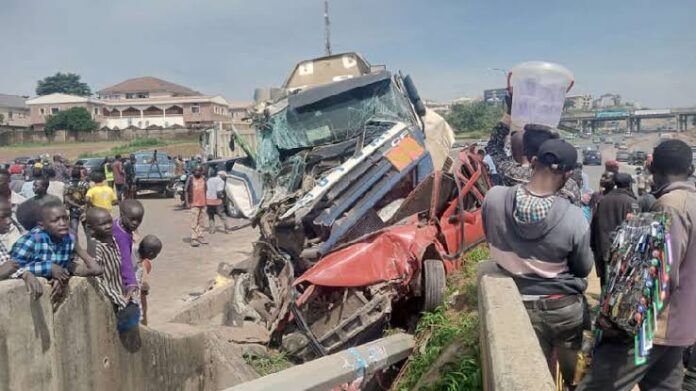Heavy Trucks, Heavy Toll: The growing menace of truck accidents in Nigeria
Story by Shalom Kasim
Last Wednesday in Auchi, Edo State, a Dangote cement truck struck a young woman, Ruth Otabor. The tragedy trended nationwide for another reason: she is the sister of Big Brother Naija winner, Phyna.
Surgeons amputated Ruth’s leg. The driver, according to eyewitness accounts and early reports, had no valid licence. Dangote quickly pledged to pay medical bills and compensation, but the bigger question has been, who gave an unlicensed driver the keys to a truck fit to carry tonnes-worth of goods?

Repeated Tragedies
The latest official numbers of such actions are blunt: 1,593 Nigerians died in road crashes in just three months (January to March 2025), an 8.3% rise in fatalities compared to Q1 2024. Behind those statistics are patterns such as poorly vetted drivers, lack of enforcement, drug and alcohol use behind the wheel, and the lethal marriage of speed, fatigue, and overloaded vehicles on compromised roads.
Who is to be blamed?
To be clear, the brand on a truck’s trailer neither confers guilt nor innocence by itself. In past incidents, local civil society groups have sometimes defended specific fleets or clarified a vehicle’s role in crashes, yet no amount of corporate philanthropy or carefully worded press releases can change the baseline truth that the risk profile of large trucks on Nigerian roads is dangerously high. Take, for example, Lagos, where container trucks have repeatedly toppled from bridges or lost braking power on crowded streets.
In January 2023, a container fell from a truck on Ojuelegba Bridge, crushing a commercial bus and killing nine, including children. In June 2025, a container truck reportedly lost control near Lagos’s Balogun Market, killing two and injuring several.
The Guardian used the incident to highlight the city’s long-standing but inconsistently enforced truck movement restrictions, noting that daytime bans meant to keep heavy vehicles off crowded corridors are routinely flouted.
READ ALSO: Yobe state university student loses life in tricycle accident, others injured Tumsah provides ₦200,000 cash support to accident victim in Yobe (Pictures)
A month later, agencies impounded at least 10 articulated vehicles violating restrictions on the Third Mainland Bridge. Beyond Lagos, the carnage can be even more dramatic. In January 2025, at Dikko junction near Suleja, a fuel tanker overturned; crowds rushed with buckets to scoop petrol, and a spill ignited, exploding into an inferno that killed at least 70 by initial counts, and later tallies stretched past 90.
Nigeria’s road-crash data landscape is improving but still fragmented. The National Bureau of Statistics (NBS) releases quarterly “Road Transport Data,” collating police and FRSC reports. In Q4 2023, NBS recorded 2,717 crashes (up 24.23% from Q3) and 1,323 deaths.
By Q1 2025, FRSC reported 2,650 crashes and 1,593 deaths, meaning that more people died per crash than the year before. A cross-section of public-health literature places Nigeria among the countries with very high road-traffic fatality risk, often above 30 deaths per 100,000 people, though precise cross-country comparisons vary by methodology and under-reporting.
The World Bank and WHO series track mortality from road injuries but caution about data limitations; nonetheless, Nigeria consistently appears in the global high-risk band.
Poor Enforcement
Then comes the licence problem: rules exist, but enforcement barely does. Nigeria has a structured system for licensing commercial drivers, with the Federal Road Safety Corps setting minimum standards, testing, and age thresholds.
For commercial heavy-duty drivers, FRSC documentation outlines a minimum age of 26 and a staged Commercial Driver’s Licence (CDL) progression, which, on paper, is a robust filter to keep inexperienced and immature drivers out of the cabs of 30-ton rigs.
In practice, however, loopholes swallow the rules. Corruption, middlemen, and weak identity verification let unqualified drivers buy their way into the system. Vehicle owners sometimes hand over keys to whoever will keep the trucks moving.
A Call for Action
The Auchi case has revived calls to audit fleets and re-verify drivers, one by one, before they return to the road. The National Association of Nigerian Students (NANS) has demanded tri-partite actions: compulsory fresh training and licensing under FRSC supervision; mandatory NDLEA drug testing for all fleet drivers; and a high-level interface to craft a binding safety framework. To be fair, not all fleets are complacent. Dangote Cement launched a dedicated driving academy in partnership with FRSC, touting structured training, simulator time, and defensive-driving modules.
In 2023, 50 “special truck drivers,” including women, graduated from the academy, yet the dissonance between polished training centres and videos of crash scenes still shows how reforms on paper have not saturated the market. Thousands of trucks on our highways are owned by smaller contractors, sub-hauliers, or informal “attached” drivers who operate outside the walls of any academy.
Underage drivers behind multi-axle trucks remain a stubborn, if under-quantified, problem. Police and traffic agencies periodically parade teenage drivers or barely-adult men arrested behind the wheel of articulated vehicles, usually after the chaos has already unfolded. Multiple episodic reports appear in local media and agency feeds; the practice persists because enforcement is sporadic.
Lagos has tried to choke off risk by limiting when and where trucks can move, but compliance is inconsistent, and exceptions multiply. If the laws say drivers must be older, tested, and certified, why do minors or unlicensed men keep showing up in cab seats? Simple: because enforcement is not designed to catch them before the crash. Roadside spot checks often focus on papers; fake papers pass. Identity checks are cursory. Fleet owners outsource responsibility to contractors, and everyone assumes the next person checked.
Substance Abuse
Substance abuse among professional drivers is a global safety risk, and Nigeria is no exception. Studies among commercial drivers report high prevalence of psychoactive substance use such as stimulants to fight fatigue and opioids and alcohol to numb aches.
While many studies focus on bus and taxi drivers, the patterns translate to long-haul trucking, where schedules are punishing and incentives reward speed over safety. A 2021 research on Nigerian long-distance truck drivers has documented the use of cough syrups, analgesics, including tramadol, cannabis, amphetamines, and tranquillisers
READ ALSO: Dangote reveals plot to crush African refineries Many feared dead as Dangote truck rams into Sienna
Other studies and reviews corroborate the link between abnormal driver behaviour and crashes in truck cohorts internationally. The supply side is relentless. NDLEA regularly intercepts truckloads of opioids moving along the very highways truckers ply. In September 2024, for instance, operatives seized a truck bearing 2.49 million tramadol tablets and capsules on the Gombe-Bauchi Expressway. If 2024 sounds like a long time ago, just two weeks ago, NDLEA announced more major seizures, part of a drumbeat of enforcement that confirms the scale of availability.
In the wake of the Auchi crash, corporate representatives stood beside hospital beds and made promises. It matters. Medical bills bankrupt families, and early compensation can determine whether a survivor walks with a prosthesis or is confined by poverty. However, real corporate leadership is less about cheques after and more about decisions before, starting with refusing to hire anyone under 26 for heavy rigs (the FRSC baseline), re-testing every driver annually, installing telematics and fatigue alarms, monitoring speed and hard-braking in real time, and firing contractors who run illegal sub-fleets of barely maintained trucks.
The hurry factor needs to be curbed urgently, too. Talk to truck drivers at roadsides waiting to take off for delivery, and you will almost definitely hear a story like, “Oga say make we reach today.” Pay structures often reward impossible timetables.
If we pay per trip, we buy speed, but if we pay per safe delivery, drivers behave differently. Public agencies can nudge this culture. Freight concession contracts should embed safety incentives and penalties. Road concessions and toll-plaza operators can deny passage to vehicles that fail quick-scan checks (container locks, tyre tread, visible defects). Insurance regulators can force higher premiums on fleets with repeated violations logged in FRSC databases.
If Nigeria wants fewer amputations and funerals, we must close the gaps that let unlicensed, underage, or drug-impaired drivers roam our highways.
Follow the Neptune Prime channel on WhatsApp:
Do you have breaking news, interview request, opinion, suggestion, or want your event covered? Email us at neptuneprime2233@gmail.com





